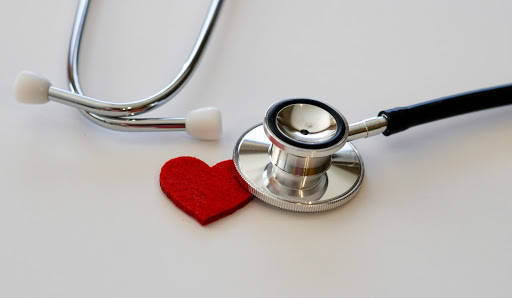Thump. Thump. Thump. Your heart continues beating every day and it’s easy to take your heart for granted until you run into problems. Taking care of your heart involves the same strategies for improving other areas of your health. Eat healthy. Reduce stress. Be active. Quit smoking. Drink less alcohol.
When you have strong motivation to apply these tips, it will be easier to stick with a healthy lifestyle. Put your hand on the top left part of your chest. Feel that beat under your fingers and decide to give your ticker a little extra care this year.
Four Heart-Healthy Strategies for Seniors

Cardiovascular disease is one of the leading causes of death in the United States. One in four deaths are caused by heart disease. The constant demands on your heart can cause this hard working muscle to become overworked. Your heart is no longer able to beat as fast as it used to when you are active. Your heart might be challenged by the buildup of fatty deposits in your arteries and have difficulty getting enough blood to and from your heart.
This can sound depressing, but you don’t want to just give up. Your heart can, at any age, benefit from tender loving care. The things you do today can delay, lower, or prevent your risk for heart disease.
Let’s imagine your heart was a beloved family pet. You would feed, walk, play, pamper, and take your pet to the vet. These are the same things you do to keep your heart healthy and happy.
1. Feed Your Heart

Eating a heart healthy diet gives your heart the necessary ingredients to keep on beating. The basic recommendations are to eat:
- Fruits, vegetables and unprocessed food
- Food high in fiber
- Foods low in saturated and trans fat
- Foods low in cholesterol
Then you need to limit:
- Salt
- Sugar
- Alcohol
Instead of focusing on what you won’t eat, make a plan to add two new healthy food choices to your day. Typically, these new foods will end up replacing an unhealthy food. When you fill your heart’s bowl with the good stuff first, you won’t have room for as many unhealthy treats.
2. Walk Your Heart

Taking your heart, and the rest of you, for a walk can help you maintain a healthy weight. You also will lower your blood pressure, blood cholesterol and blood sugar. Physical activity has the double bonus of being good for your heart physically as well as being a good way to reduce stress. It is recommended that you aim for 2 hours and 30 minutes of brisk activity every week. This can include exercise videos, yoga, dancing, or just going for a nice walk.
3. Pamper Your Heart
Your heart needs lots of time to play, as well as good rest. Look for ways in your day that you can find a place of calm and relax. When you focus on deep breathing and relaxing you slow down your heart rate. In fact, studies have shown how meditation can decrease the risk of heart disease.This gives your hardworking heart a chance to recover.
4. See Your Doctor

Your family pet might hate going to the vet, but your heart will thank you for taking the time for regular checkups with your doctor.
You can work together with your health care team to make sure that you prevent, treat, or reduce problems that cause heart disease.
Make sure you are taking your medications to manage your cholesterol, blood pressure, and diabetes.
Symptoms of Heart Disease
Heart disease can creep up on you quietly, you may not notice many of the symptoms. You need to talk to your doctor about any of these symptoms:
- Pain, numbness, or tingling in your shoulders, arms, neck, jaw or back
- Difficulty breathing when you are moving, resting, or lying flat
- Pain in your chest when you are active that goes away when you rest
- Feeling dizzy, lightheaded, or confused
- Headaches, feeling tired and fatigued
- Feeling nauseous and cold sweats
- Swelling in your ankles, feet, legs, stomach, or neck
Get your heart checked out if you are feeling more weak, dizzy, tired, or feeling short of breath when you are moving around.
Warning Signs of a Heart Attack
A heart attack is what happens when there is a block preventing blood from getting to your heart muscle. If you or a loved one experience these signs, it is a medical emergency and you need to call 9-1-1 immediately.
These are the signs of a heart attack:
- Heavy chest pain or pressure in the upper body, neck or arms
- Nausea
- Cold sweats
- Fainting or lightheadedness
- Shortness of breath
Show Your Heart Some Love
The heart is a universal symbol of love. It keeps you going, it keeps you warm, it pulls you through hard times. This month, for American Heart Month, would you be willing to show your industrious heart a little bit of extra love?
References
Centers for Disease Control and Prevention: Prevent Heart Disease
As a leading age care provider, Home Care Assistance offers tailored in-home care services for older Australians, enabling them to live happier and healthier lives in the comfort of their own homes.
We offer private and government subsidised Care Packages and have office locations that are a registered NDIS provider. Our Care Workers undergo extensive training in order to deliver unmatched in-home aged care services where people can continue ageing in place. We are proud ambassadors of the My Aged Care government funded aged care program, enabling Australians to successfully navigate the process and gain approval for in-home care support packages. Home Care Assistance offers hourly care, specialised care, Alzheimer’s and Dementia care, hospital to home care, and 24 hour in home care.













